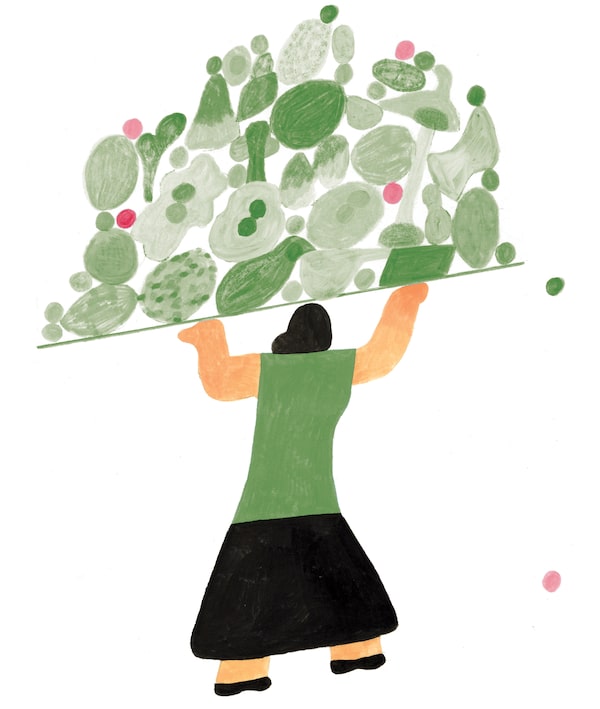First Person is a daily personal piece submitted by readers. Have a story to tell? See our guidelines at tgam.ca/essayguide.

Illustration by Mary Kirkpatrick
I spent all of my 30s saying yes. Saying yes to things I wanted to do, but a lot of the time saying yes to things I despised and dreaded. This was a people-pleasing technique that I figured would accelerate people’s opinion of me: the woman who could do it all. It was also about proving to myself that I had a full and meaningful life, and my definition of that was juggling everything and being everywhere. As a mother of three and a professional working full time, my plate was already full, but somehow I thought it never felt full enough.
At the time, I thought I was killing it. I was making new friends, developing new interests, listening to podcasts about how to improve my health, my family, my gardening, my career. I joined the board of my children’s school, ran most every day and crammed about 20 other activities into each and every day.
After getting my children ready for school, I’d squeeze in an hour of intense cardio, take a quick shower and then bolt to work. After a busy workday, often not even eating lunch, I’d leave work “early” (in the eyes of my colleagues), to rush to get my kids from school and start part two of my day: a battery of afterschool activities, tutors, homework, groceries, going to the pharmacy, going to the orthodontist, dentist, doctor, barber, cooking dinner, reading, bedtime stories, baths and that’s just the tip of the iceberg.
Little did I know that I was also developing an autoimmune disease, which I have to believe was my body’s way of telling me to slow down. I had severely swollen joints, brain fog and dysfunctional digestion but I pushed through so that I could look in the mirror at the end of the day and feel “accomplished.” The only things I was accomplishing were bad health and bad habits.
I wanted to show all three of my children, but especially my two daughters, that women can have it all and do it all.
And then a trifecta of events changed everything: pandemic restrictions, serious medical issues and losing my job. It took all that to help me see how intensely and detrimentally burnt out I was.
All at once, I realized how good it felt not to be busy every second of every day. For the first time, I had the luxury of being thoughtfully selective about how I spent my days. Having to say no turned into the beauty of choosing to say no.
It occurred to me that there was a thoughtlessness to my jam-packed days. I spent a lot of time thinking about where I had to be next instead of being present in the moment. Don’t get me wrong, my overactive brain still has a hard time being present, but now, I wake up each day knowing that everything on my schedule has been purposefully agreed to.
I still have to take out the garbage and pay bills and do a whole bunch of other things that I wish I could say no to, but the difference is palpable and the pace of my day is lighter. It feels easier to do the things I wish I could say no to because I’ve chosen to say no to a whole slew of other things. I no longer feel beholden to my own expectations of what a “successful” life looks like anymore.
In retrospect, the pressure to say yes and to smile was my choice. The façade that I had created in my head of what a rich and meaningful life looked like was all jumbled up with never wanting to let anyone down. Someone brilliant once said, and here I am paraphrasing, that the generation of women who were raised to believe they could be anything grew to believe that they had to be everything. I felt I had to be everything.
I felt obliged to say yes, from driving people to the airport to swapping a carpool day, from attending charity events to seeing family every Friday night. I always wanted to solve everyone’s problems and offered sound and immediate solutions. I cared and internalized (maybe too deeply) about the issues that my family and friends and even acquaintances were going through. It was one big “yes” to everything.
I was everyone’s cheerleader, but forgot how to cheer for myself along the way.
But saying no is being my own cheerleader. And it’s not saying no to caring for family and friends, or helping someone out when they’re in a pinch. Instead, it’s a subtle change in mindset, taking a pause before automatically agreeing. I take a breath, do a quick inventory of my energy and ability before jumping in.
I still do a million things with my kids, I still work and I am on a not-for-profit board. I love to see friends and family, but I say no to people who I don’t think serve me, or have my best intentions at heart. I say no to some family gatherings. I say no to some dinners with friends.
Most importantly, I tell my kids there’s nothing wrong with saying no. And saying it without an explanation, justification, a caveat or an alternative. To give of yourself is important but to conserve yourself is important, too.
Jessica Yaffe lives in Montreal.